Fireworks: a dazzling display of light and sound that mark celebrations around the world. But while we humans “ooh” and “ahh,” our canine companions often cower in fear. Why are dogs scared of fireworks? If you’ve ever witnessed your furry friend trembling or hiding during a fireworks display, you know it’s not just a minor aversion; it’s often sheer terror.
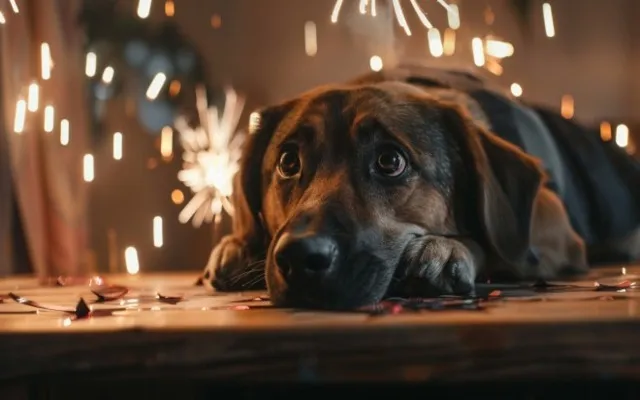
Understanding why this fear occurs is the first step towards helping our dogs cope. As a devoted dog parent myself, I’ve delved deep into the science and psychology behind this common phobia. In this article, we’ll uncover the reasons behind dogs’ fear of fireworks and explore practical strategies to help them feel safe and secure during these noisy events. By the end, you’ll be equipped with the knowledge and tools to make fireworks a little less stressful for your furry family member.
Why the Boom? Understanding the Causes of Canine Fear
To effectively soothe our dogs’ firework fears, we first need to grasp the root causes of this widespread phobia. Here’s a breakdown of the key factors:
1. Super Sonic Hearing
Dogs possess an extraordinary sense of hearing that far surpasses our own. While humans can typically hear sounds up to 23,000 Hertz (Hz), dogs can hear frequencies as high as 45,000 Hz or even 60,000 Hz in some breeds. This means the explosive booms of fireworks are amplified to an earsplitting intensity for our furry friends.
Imagine someone unexpectedly blasting an air horn right next to your ear—that’s a milder version of what your dog experiences during a fireworks show. No wonder they find it so terrifying!
2. Unpredictable Chaos
Beyond the sheer volume, the unpredictability of fireworks is another major stressor for dogs. Our canine companions thrive on routine and predictability. The sudden, jarring explosions disrupt their sense of security and can leave them feeling vulnerable and disoriented.
3. Negative Associations
For some dogs, their fear of fireworks stems from a previous traumatic experience. Perhaps they were lost or separated from their family during a fireworks display, or maybe they were startled by a particularly loud explosion. These negative associations can become deeply ingrained, leading to a lasting phobia.
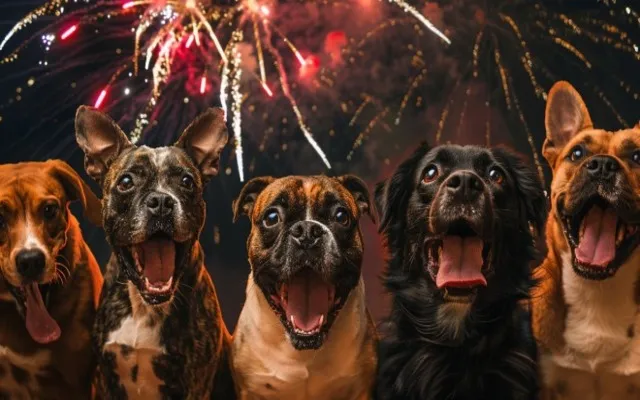
4. Breed Predispositions
Certain breeds seem more prone to noise sensitivity than others. Herding dogs, sporting breeds, and those bred for guarding often have a heightened startle reflex due to their genetic makeup. However, it’s important to note that any dog, regardless of breed, can develop a fear of fireworks.
5. Other Contributing Factors
While the above factors are the primary culprits, several other elements can intensify a dog’s fear of fireworks:
- Age: Senior dogs may be more sensitive to loud noises due to age-related hearing loss.
- Health: Dogs with underlying anxiety or medical conditions may be more prone to stress and fear.
- Environment: A dog’s surroundings during a fireworks display can significantly impact their reaction. A familiar, secure environment can offer some comfort, while an unfamiliar or chaotic setting can exacerbate their fear.
Calming Canine Fears: Practical Strategies to Help Dogs Cope with Fireworks
As the festive season approaches, dazzling fireworks displays illuminate the night sky, bringing joy and wonder to many. However, for our canine companions, these vibrant celebrations can trigger intense fear and anxiety. The sudden, loud explosions and unpredictable nature of fireworks can be overwhelming for dogs, leading to a range of distressing behaviors, including trembling, hiding, excessive barking, and even destructive actions.
Understanding the root causes of dogs’ fear of fireworks is the first step towards effectively addressing this issue. As we delve into the psychology behind this common phobia, we’ll also explore practical strategies to help our furry friends feel safe and secure during these noisy events. You can refer to other documents about Canine appeasing pheromone: a review of its properties, mechanisms of action, and clinical applications.
Creating a Safe Haven
When fireworks fill the air, your dog’s primary instinct is to seek refuge. Providing a safe and secure haven within your home can offer immense comfort and reassurance. Choose a quiet, interior room, such as a basement or an enclosed bedroom, away from windows and exterior doors. Ensure the room is dimly lit to minimize the visual impact of fireworks flashes.
Transform this haven into a sanctuary for your dog. Fill it with familiar bedding, toys, and treats to create a sense of familiarity and comfort. Consider playing calming music or white noise to mask the sounds of fireworks. If your dog feels particularly anxious, a pheromone diffuser can provide a sense of relaxation.
Desensitization and Counterconditioning
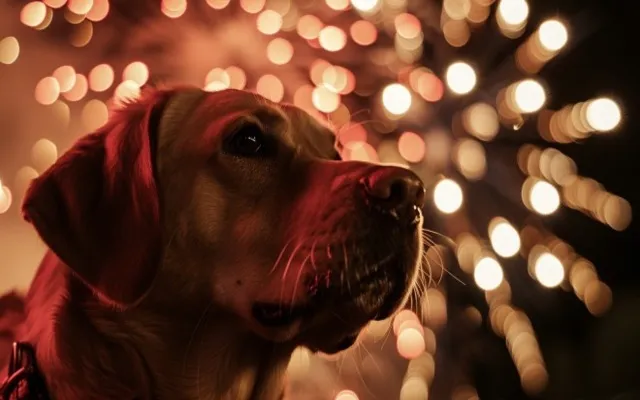
For dogs with severe firework phobia, desensitization and counterconditioning techniques can gradually help them associate fireworks with positive experiences. This process involves slowly exposing your dog to the sounds of fireworks at a low volume while pairing them with positive reinforcements, such as treats, praise, and petting.
Begin by playing recordings of fireworks at a very low volume, ensuring your dog remains calm and relaxed. If they show signs of anxiety, pause the recording and provide reassurance. Gradually increase the volume over time, always maintaining your dog’s comfort level. Pair the fireworks sounds with treats, praise, and playful interactions to create positive associations.
Calming Aids and Medication
In some cases, additional calming aids or medication may be necessary to manage your dog’s anxiety during fireworks displays. Thundershirts, pressure garments that apply gentle pressure to the body, can provide a sense of security and relaxation. Calming supplements, such as melatonin or pheromone sprays, can also help reduce stress and promote calmness.
If your dog’s anxiety is severe, consult your veterinarian to discuss medication options. Anti-anxiety medications can be prescribed to help your dog cope with fireworks and other stressful situations. However, it’s crucial to seek professional guidance before administering any medication to your dog.
Patience, Understanding, and Support
Throughout the process of helping your dog cope with fireworks, remember to exercise patience, understanding, and unwavering support. Fear is a natural response, and your dog’s anxiety is not a reflection of their behavior or training.
Avoid scolding or punishing your dog for their fearful reactions. Instead, offer reassurance and comfort. Stay calm and composed, as your demeanor can significantly influence your dog’s emotional state.
With patience, consistency, and the right strategies, you can help your furry friend overcome their fear of fireworks and enjoy the festive season without distress. Remember, every dog is unique, and what works for one may not work for another. Experiment with different techniques and find what best suits your dog’s individual needs.
By creating a safe haven, implementing desensitization and counterconditioning, utilizing calming aids when necessary, and providing unwavering support, you can transform fireworks from a source of fear into a time of bonding and reassurance for your beloved canine companion.
Additional Strategies and Considerations for Firework-Phobic Dogs
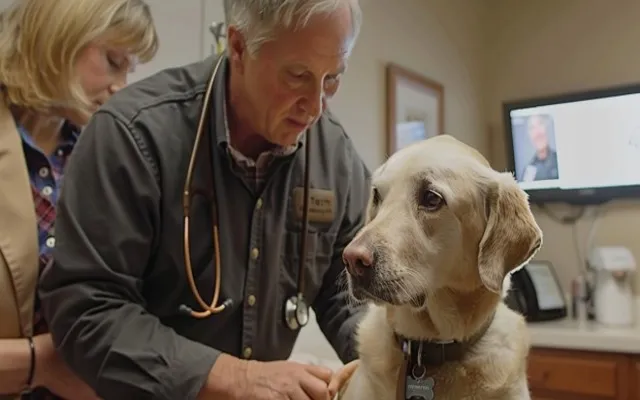
While the previously mentioned methods offer valuable tools for managing your dog’s firework anxiety, there are additional considerations and strategies that can further enhance their well-being during these stressful events.
Veterinary Consultation and Medication
If your dog’s fear of fireworks is severe and debilitating, consult with your veterinarian. They can assess your dog’s individual needs and recommend appropriate medication or calming aids. In some cases, prescription medications may be necessary to alleviate severe anxiety and panic.
Remember, medication should only be used under veterinary supervision and as part of a comprehensive management plan. Never self-medicate your dog, as incorrect dosages or inappropriate medications can worsen their anxiety or lead to adverse side effects.
Professional Behavior Modification
For dogs with deep-rooted firework phobias, professional behavior modification may be beneficial. Certified animal behaviorists or dog trainers specializing in fear and anxiety can develop a tailored desensitization and counterconditioning program to address your dog’s specific needs.
These professionals can guide you through the process, ensuring a safe and effective approach. They can also provide valuable insights into your dog’s behavior and help you implement strategies to minimize stress and maximize well-being.
Community Awareness and Advocacy
As a responsible dog owner, advocating for a safer and more considerate environment for dogs during firework events is essential. Engage with your community and local authorities to raise awareness about the impact of fireworks on dogs and other animals.
Encourage the use of quieter fireworks or alternative celebrations that prioritize animal welfare. By working together, we can create a more inclusive and compassionate environment for all.
Dog-Specific Fireworks Displays
Some communities have started organizing dog-friendly fireworks displays, which feature quieter fireworks and calming music. These events aim to provide a less stressful experience for dogs and their owners.
If such events are available in your area, consider attending them with your dog. However, observe your dog’s reactions carefully, as even quieter fireworks may still trigger anxiety in some individuals.
Microchipping and Identification
Ensuring your dog is microchipped and wears a collar with up-to-date identification tags is crucial during fireworks season. The loud noises and chaotic environment can easily spook dogs, causing them to run away and become lost. A microchip or ID tag can significantly increase the chances of a safe reunion if your dog becomes separated from you.
Unveiling Lesser-Known Insights: Exploring Unique Aspects of Firework Phobia in Dogs
As we delve deeper into the complexities of firework phobia in dogs, let’s explore some lesser-known aspects that can shed further light on this issue and enhance our understanding.
The “Firework Sensitivity Gene”
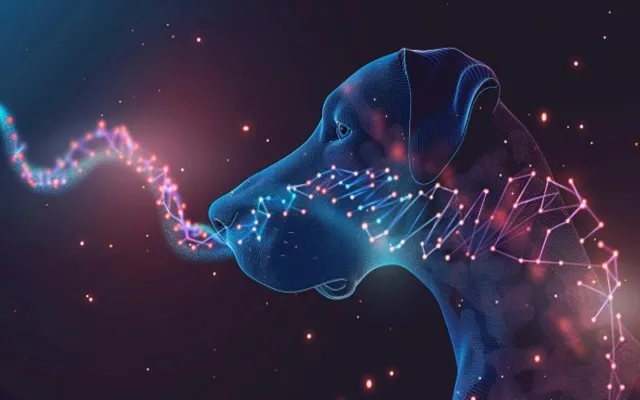
Recent research suggests that a specific gene variant may predispose certain dogs to noise sensitivity, including fear of fireworks. While this gene doesn’t solely determine a dog’s reaction to loud noises, it may play a significant role in their overall sensitivity and susceptibility to phobias.
Understanding this genetic component can help us identify dogs who may be at higher risk of developing firework anxiety and implement preventive measures early on. It can also guide breeding practices to reduce the prevalence of noise sensitivity in future generations.
The “Secondhand Fear” Phenomenon
Dogs are highly social animals and often pick up on the emotional cues of their fellow canines. If a dog witnesses another dog displaying fear or anxiety during fireworks, they may learn to associate fireworks with danger and develop a similar fear response.
This phenomenon, known as “secondhand fear,” highlights the importance of early socialization and positive experiences for puppies. Exposing young dogs to a variety of sights and sounds, including controlled exposure to fireworks, can help them develop resilience and reduce the likelihood of developing phobias later in life.
The Impact of Early Experiences
A dog’s early experiences, especially during their critical socialization period (between 3 and 14 weeks of age), can significantly shape their future behavior and emotional responses. Puppies exposed to a variety of stimuli in a positive and controlled manner are less likely to develop fears and phobias later in life.
Conversely, puppies who experience trauma or lack adequate socialization may be more prone to anxiety and fear-related behaviors, including firework phobia. This underscores the importance of providing puppies with enriching experiences, positive reinforcement, and gradual exposure to different environments and sounds.
The Role of Pheromones
Pheromones, chemical substances released by animals to communicate with each other, can play a role in managing anxiety and fear in dogs. Synthetic pheromone products, such as sprays and diffusers, mimic the calming pheromones naturally produced by mother dogs to soothe their puppies.
While pheromones are not a cure-all for firework phobia, they can provide additional support in managing your dog’s anxiety. When used in conjunction with other strategies, such as creating a safe haven and desensitization, pheromones can contribute to a more relaxed and comfortable experience for your dog during fireworks displays.
Embracing Calm Amidst the Chaos: Additional Insights into Firework Phobia
As we continue our exploration of firework phobia in dogs, let’s delve into a few additional insights that can shed further light on this complex issue:
The Power of Pressure: Thundershirts and Anxiety Wraps
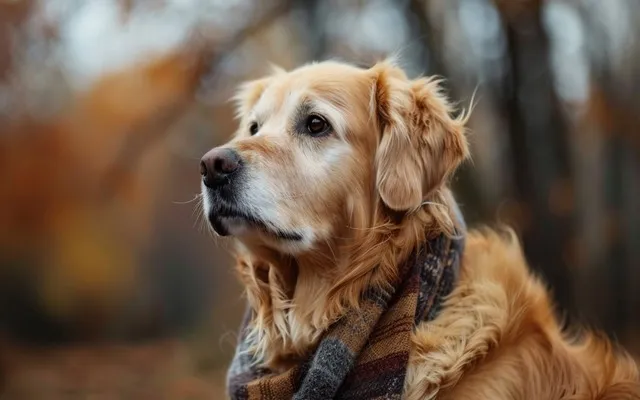
Thundershirts and anxiety wraps are snug-fitting garments that apply gentle, constant pressure to a dog’s body. This pressure is believed to have a calming effect, similar to swaddling a baby. These wraps can be particularly helpful for dogs experiencing anxiety during fireworks or other stressful situations.
Studies have shown that Thundershirts and anxiety wraps can reduce anxiety-related behaviors in dogs, such as trembling, panting, and pacing. While they may not work for every dog, they are a non-invasive option worth considering, especially when combined with other calming strategies.
Natural Remedies for Calming Nerves
In addition to conventional approaches, natural remedies can offer gentle support for dogs with firework anxiety. Certain herbs and supplements, such as chamomile, valerian root, and L-theanine, have calming properties and may help reduce stress and anxiety.
Before administering any natural remedies to your dog, consult with your veterinarian to ensure they are safe and appropriate for your dog’s individual needs. Some herbs and supplements may interact with medications or have adverse effects in certain dogs.
The Role of Music Therapy
Music therapy has emerged as a promising tool for managing anxiety and stress in dogs. Certain types of music, particularly classical or reggae music with slow tempos and soothing melodies, can have a calming effect on dogs.
Studies have shown that music therapy can reduce stress hormones in dogs and promote relaxation. Consider creating a playlist of calming music for your dog to listen to during fireworks displays or other stressful events.
Essential Oils and Aromatherapy
Certain essential oils, such as lavender and chamomile, have relaxing properties and may help alleviate anxiety in dogs. These oils can be diffused in the air or diluted and applied topically to your dog’s fur or skin.
However, it’s crucial to use essential oils with caution and under the guidance of a veterinarian or certified aromatherapist. Some oils can be toxic to dogs if ingested or applied incorrectly. Always dilute essential oils properly and avoid using them on puppies or pregnant or nursing dogs.
Proactive Planning for Public Events
If you know your dog is sensitive to fireworks, proactive planning can help minimize their exposure to stressful situations. Check local event calendars and identify dates and locations of upcoming fireworks displays. Avoid areas where fireworks are likely to be set off, and plan alternative activities or outings during those times.
If you must be in an area with fireworks, take precautions to protect your dog. Keep them indoors in a safe and quiet space, and consider using calming aids, such as Thundershirts or pheromone diffusers.
Conclusion
As we conclude this exploration of firework phobia in dogs, it’s clear that this issue is complex and multifaceted. However, armed with knowledge, empathy, and a toolbox of practical strategies, we can make a real difference in our dogs’ lives.
By understanding the root causes of their fear, creating a safe haven, implementing desensitization and counterconditioning techniques, and providing unwavering support, we can help our canine companions navigate the challenges of firework phobia.
Remember, every dog is unique, and their journey towards overcoming fear will vary. Some dogs may respond quickly to interventions, while others may require more time and patience. Celebrate every small victory and be a source of comfort and reassurance for your furry friend.
With your love and dedication, you can help your dog not only survive but thrive during fireworks displays. By fostering a fear-free future, you’ll strengthen your bond and create lasting memories filled with joy, not fear.
FAQs
Why are some dogs scared of fireworks while others seem unbothered?
Dogs have varying sensitivities to loud noises and different experiences that shape their reactions. Some breeds may be predisposed to noise sensitivity, while individual temperament and past experiences also play a role. A dog who has had a negative experience with fireworks in the past may be more likely to develop a phobia.
Can a dog’s fear of fireworks get worse over time if not addressed?
Yes, without intervention, a dog’s fear of fireworks can escalate over time. Repeated exposure to the loud noises and bright lights can reinforce their anxiety, leading to a heightened fear response in the future. Early intervention with desensitization, counterconditioning, and calming techniques can help prevent this escalation.
Are there any long-term health effects for dogs who are chronically scared of fireworks?
Chronic stress and anxiety, including that caused by firework phobia, can negatively impact a dog’s overall health and well-being. It can weaken their immune system, lead to digestive problems, disrupt their sleep patterns, and even contribute to behavioral issues. Addressing their fear is crucial for their long-term health.
Are there any signs that my dog is scared of fireworks beyond shaking and hiding?
Yes, there are many subtle signs. Some dogs might pant excessively, pace restlessly, whine, drool, have dilated pupils, lose their appetite, or even become destructive. Others might seek excessive attention or become unusually clingy during fireworks displays.
I’ve tried everything, and my dog is still terrified of fireworks. What else can I do?
If your attempts to manage your dog’s fear haven’t been successful, consider consulting a veterinarian or a certified animal behaviorist. They can assess your dog’s individual needs and recommend further treatment options, such as medication or specialized behavior modification techniques.
Is it ever too late to help a dog overcome their fear of fireworks?
It’s never too late to help a dog who is scared of fireworks. While younger dogs may be easier to desensitize, older dogs can also learn to cope with their fear with patience, consistency, and the right approach.
Are there any natural remedies that can help calm my dog during fireworks?
Yes, some natural remedies like calming herbs (chamomile, valerian root) and supplements (L-theanine) may offer gentle support for anxiety. However, always consult your veterinarian before using any natural remedies, as they may not be suitable for all dogs or could interact with existing medications.
Besides traditional fireworks, what other events or situations might trigger a similar fear response in my dog?
Dogs with noise sensitivities might also react fearfully to thunderstorms, gunshots, loud vehicles, construction noises, or other sudden loud sounds. Identifying these triggers can help you proactively manage your dog’s anxiety in various situations.

Healthy dogs mean happy dogs, and that makes me happy! I’m here to share all the tips for keeping your best furry friend in top shape, from puppyhood to their golden years.
